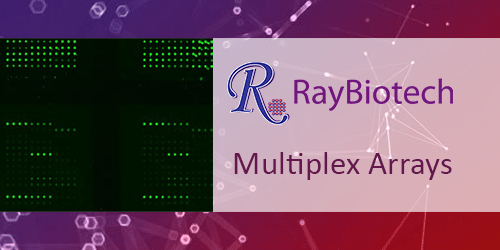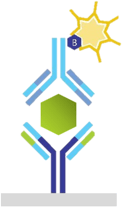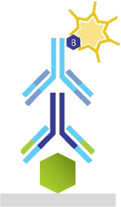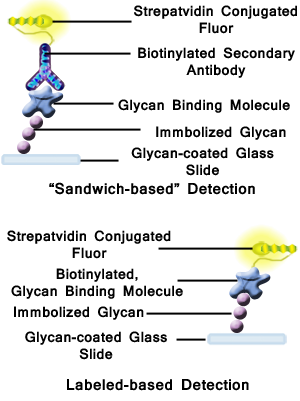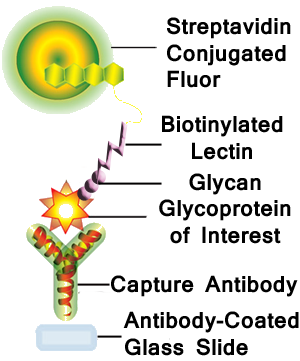RayBiotech - Multiplex Arrays
Protein Arrays, Antibody Arrays, Glycobiology Arrays
> 700 tested Multiplex Arrays, ISO certified Manufacturer
RayBiotech (ISO 13485:2016 certified) manufactures over 700 rigorously tested multiplex arrays. RayBiotech provides quantitative and semi-quantitative Antibody arrays, Protein arrays, Peptide mapping arrays, Phosphorylation arrays, Glycobiology arrays and RayPlex™, which are Cytometric Bead arrays. All RayBio® arrays are manufactured in the USA.
Check out also RayBiotech’s multiplex array GLP testing services and scanning and analysis services.
Antibody Arrays
More Data, Less Sample!
Antibody arrays are a multiplex assay that simultaneously measures the expression of multiple proteins. They allow a much broader view of protein activity than can be obtained with single-target ELISAs and western blots. Several platforms (planar vs. bead-based) and techniques for visualizing protein expression (chemiluminescent, fluorescent, etc.) can be used depending on the sample or analyte requirements, which allows for a more comprehensive analysis of biological responses and functions and identification of key factors or disease mechanisms. Read more
Featured:
Quantibody® Multiplex ELISA
Capture 4x the data with much less sample - Process 100s of samples a day
Build a clear and accurate picture of the expression levels of multiple proteins simultaneously with Quantibody® Mulitplex ELISAs.
Combining the specificity and sensitivity of an ELISA with the high throughput of an array, Quantibody® is an array-based multiplex ELISA system for the simultaneous quantitation of multiple cytokines, growth factors, proteases, soluble receptors, and other proteins from a wide range of sample types.
With this platform, you need a mere 50 µL of sample to quantify up to 40 proteins in quadruplicate, making this array 80 times more efficient than traditional ELISA.
- More cost-effective than traditional ELISA
- High specificity and system reproducibility
- Suitable for diverse sample types
- Low sample volume requirement
- Get results same day (6-hour processing time)
- Well-suited for high throughput assays
- Q Analyzer software provides one-step computation
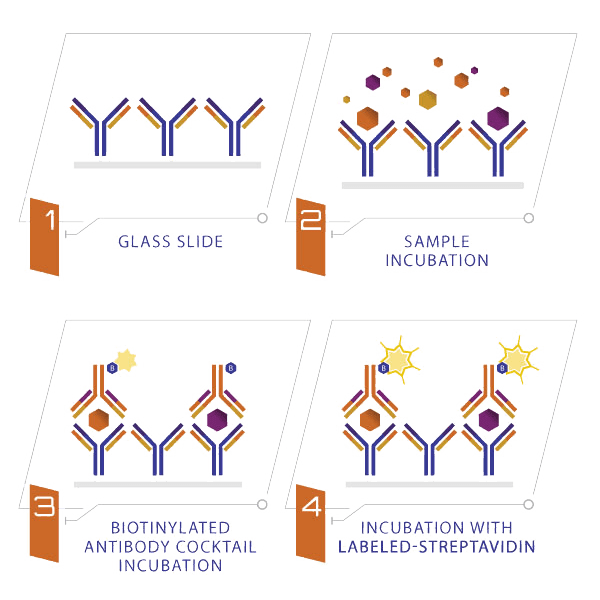
Featured:
Cytometric Bead Arrays: RayPlex™
Quantitative Multiplex Bead Immunoassay
RayPlex™ Cytometric Bead Arrays enable high throughput multiplex protein detection in a wide variety of sample types with flow cytometry. By using different combinations of microbead sizes and fluorophores, multiple target proteins are analyzed simultaneously. RayPlex™ features low sample volume requirements, high specificity, and high reproducibility using a standard flow cytometer. Read more
Features
- Quantify up to 25 proteins with 25 µl or less sample
- 4 hour processing time
- 5-10x more cost-effective than ELISA
- Compatible with most flow cytometers (PE and APC channels)
Research Applications
- High-throughput profiling of cytokine expression
- Validation of semi-quantitative antibody array results
- Identifying potential molecular targets for drug development
- Identifying the molecular mechanisms of drug action
- Identifying crucial factors involved in disease processes
- Discovering biomarkers for disease management
- Discovering expression patterns for molecular classification of diseases
Workflow

Categories of Antibody Arrays
| Array | Output | Support | Detection | Description | ||
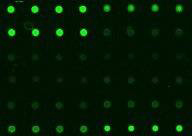 |
Quantibody | Quantitative | Glass | Fluorescent | Quantify the amount of your proteins of interest in a wide variety of sample types | Read more |
 |
C-Series | Semi-quantitative | Membrane | Chemiluminescent | Compare the relative changes of your proteins of interest across different experimental conditions | Read more |
 |
L-Series | Semi-quantitative | Glass or Membrane | Fluorescent or Chemiluminescent | Screen a large number of proteins to identify your proteins of interest. Largest array available! | Read more |
 |
G-Series | Semi-quantitative | Glass | Fluorescent | Compare the relative changes of your proteins of interest across different experimental conditions | Read more |
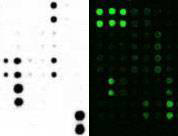 |
Phosphorylation | Semi-quantitative | Glass or Membrane | Fluorescent or Chemiluminescent | Detect phosphorylated proteins in specific pathways | Read more |
| RayPlex™ | Quantitative | Microbeads | Flow Cytometer | Quantify your proteins of interest in a wide variety of sample types | Read more | |
 |
Isotyping | Semi-quantitative | Glass | Fluorescent | Analyze the levels of different immunoglobulin isotypes |
Read more |
Protein Arrays
RayBio® Protein Microarrays
RayBio® Protein Arrays are a versatile and innovative series of products featuring immobilized proteins spotted onto a glass slide support to profile serological (auto)antibodies as well as study protein interactions with other proteins, peptides, DNA, and drugs.
Protein arrays are semi-quantitative and allow a much broader view of protein activity than a traditional ELISA. RayBio arrays come in smaller, research specific panels as well as broad screening panels. Read more
| Array | Output | Support | Detection | Description | ||
 |
Allergen | Semi-quantitative | Glass | Fluorescent | Screen IgG and/or IgE levels for specific allergens | Order |
 |
Autoimmune Disease | Semi-quantitative | Glass | Fluorescent | Screen specific auto-antibodies associated with autoimmune diseases | Order |
 |
Cancer | Semi-quantitative | Glass | Fluorescent | Screen specific auto-antibodies associated with cancer | Order |
 |
Coronavirus | Semi-quantitative | Glass | Fluorescent | Display peptides and proteins representing antigens from SARS-CoV-2 as well as other coronaviruses | Order |
 |
Monkeypox Virus | Semi-quantitative | Glass | Fluorescent | Display 11 important monkeypox virus proteins, such as A29L, A30L, A33R, A35R, B16R, C19L, D6L, E8L, H3L, I1L, L1R, etc | Order |
 |
Epitope Mapping | Semi-quantitative | Glass | Fluorescent | Pre-made epitope mapping arrays | Order |
 |
Porcine Cytokine | Semi-quantitative | Glass | Fluorescent | Detect 51 essential pig cytokine proteins in protein-protein interactions, antibody specificity, auto-antibodies, small molecule-protein interactions, etc. |
Order |
Glycobiology Arrays
Empowering Your Glycomics
RayBio® Glycobiology Arrays are a versatile and innovative series of products designed to detect glycosylation. Glycosylation plays an important role in a wide variety of disease processes including tumor cell metastasis, inflammation and bacterial pathogenesis. The RayBio® Glycobiology Arrays are available in three different formats for detection of glycans or glycan-protein interactions. All 3 formats feature glass slide supports with fluorescent detection.
RayBiotech's Array Services
Maximize productivity – Entrust experienced scientists at RayBiotech. RayBiotech can custom-print an array or use off-the-shelf products, conduct the study, and even include data analysis and interpretation.

Quantitative Proteomics Services (Quantibody)
Develop deeper insights with precise, ultrasensitive, and quantitative proteomics services.
- Benefit from RayBiotech’s GLP-compliant Quantibody® Multiplex ELISA platform.
- Detect up to 1200 human, 640 mouse, 282 rat, 50 porcine, or 30 bovine proteins
- Receive a full report including all raw data and step-by-step calculations
Discovery Proteomics Services (Semi-quantitative)
Maximize the number of proteins that are simultaneously assessed to efficiently identify key proteins of interest.
- Semi-quantitative, high-density arrays
- Label-based or sandwich-based
- Screen 8000 human, 1308 mouse, 1500 rat, 50 porcine, 30 bovine, or 500 rabbit proteins, or create a custom array
- Choose any antibody array product to quickly screen for biomarkers and other targets
Array Scanning and Analysis
- FREE scanning service for all glass slide antibody arrays
- FREE data extraction for G-Series, Quantibody, and L-Series
Microarray Printing Service
Custom microarray printing services for any biomolecules, including antibodies, proteins, glycoproteins, glycolipids, biological fluids, peptides, etc.
Custom Protein Array Services
- Human Receptors
- Human Proteins
- Mouse Proteins
- Pig (porcine) Proteins
- Allergen Proteins
Custom Antibody Array Services
- 8,000 target proteins for human, 1308 mouse, 1500 rat etc.
- 4 different assay formats
- Highly specific, validated antibody pairs
Custom Epitope Mapping Arrays
Identify antigen binding sites of an antibody or other protein interactions with high affinity, including those with proteins, chemicals, and DNA.

